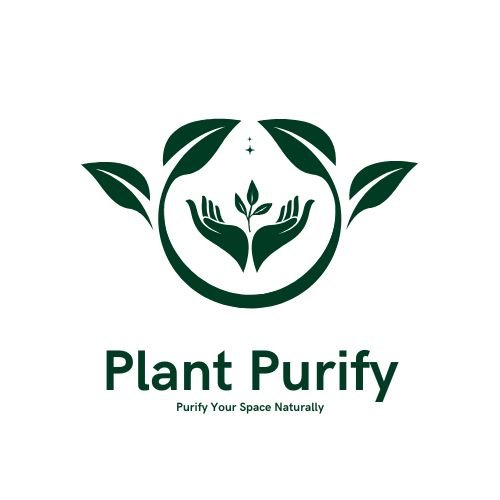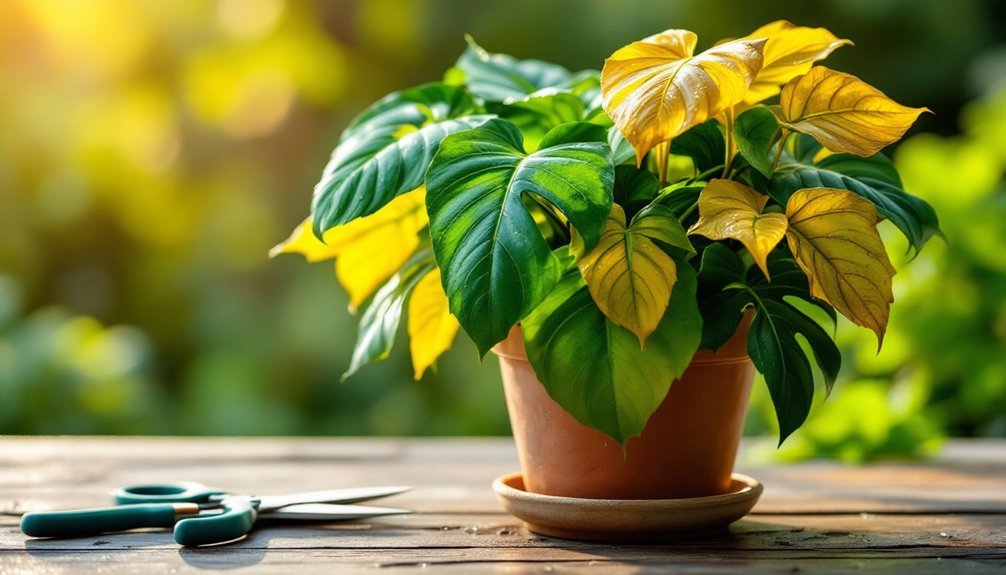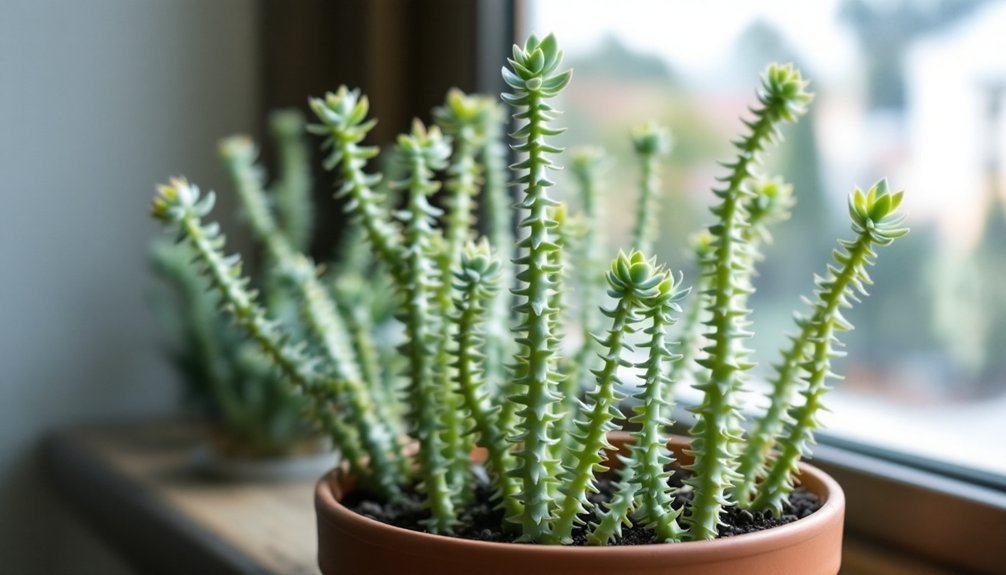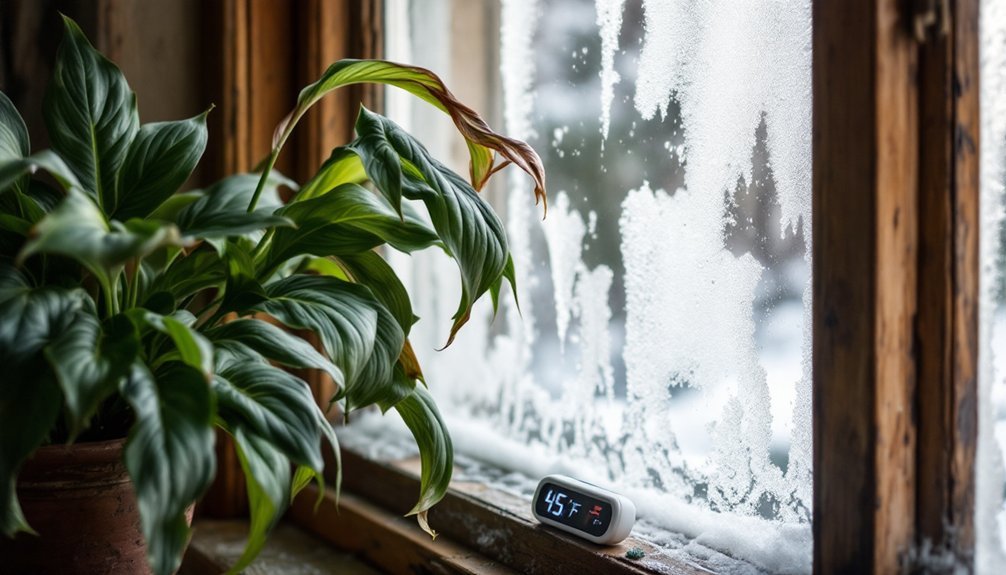You've probably noticed that even the healthiest plants can struggle when their soil doesn't drain properly. Whether you're dealing with waterlogged containers or soggy garden beds, the right drainage rocks can make all the difference. While many gardeners default to basic gravel, there's actually a world of specialized options that can transform your plants' growing environment. Let's explore seven expert-tested drainage rocks that'll help your garden thrive without breaking the bank.
Calofulston 5lb Drainage Rocks for Potted Plants (Mixed Color)

Whether you're a plant enthusiast or aquarium hobbyist, Calofulston's 5lb drainage rocks offer an ideal solution for both aesthetic appeal and functionality. These 1/5-inch non-toxic pebbles provide essential drainage while preventing root rot in your potted plants.
You'll find these mixed-color rocks versatile enough for multiple applications. They're perfect for regulating soil moisture, preventing weed growth, and creating an attractive top layer for your plant containers. For aquarium owners, they serve as an excellent substrate that's safe for aquatic life.
Simply rinse before use, and you're ready to enhance your terrariums, succulent planters, or fish tanks with these natural-looking, high-quality stones.
Best For: Plant enthusiasts, aquarium hobbyists, and home gardeners looking for versatile, attractive drainage rocks for both decorative and functional purposes in potted plants, terrariums, and aquariums.
Pros:
- High-quality, non-toxic material safe for both plant and aquatic life
- Versatile application for multiple uses including drainage, decoration, and weed prevention
- Perfect size (1/5 inch) and quantity (5lb) for small to medium projects
Cons:
- Requires initial rinsing before use
- Some customer reports of quantity/description variations
- Limited to smaller projects due to 5lb package size
Drainage Rocks for Potted Plants (2.5 lbs, 1/5 Inch)
Perfect for indoor gardeners and plant enthusiasts, these 2.5-pound bags of 1/5-inch drainage rocks offer both functionality and aesthetic appeal for your potted plants. You'll find stones ranging from 1/5 to 3/8 inch, ideal for bonsai, succulents, terrariums, and cacti.
These naturally formed river rocks prevent soil erosion while enhancing your plants' visual appeal. They're also versatile enough for aquariums and fish tanks. Before using, wash them 2-3 times to ascertain cleanliness. While most users praise their quality and effectiveness, you might notice slight variations in appearance between batches. The rocks retain heat well, making them suitable for warming baby rehab animals in canvas bags.
Best For: Home gardeners and plant enthusiasts looking for functional drainage solutions for indoor potted plants, terrariums, and small-scale landscaping projects.
Pros:
- Versatile size range (1/5" to 3/8") makes them suitable for various applications from bonsai to terrariums
- Natural, environmentally friendly material that provides both decorative appeal and practical drainage
- Good value for money with sufficient quantity (2.5 lbs) for multiple medium-sized pots
Cons:
- Requires initial washing before use which adds preparation time
- Inconsistent appearance between different batches
- Limited quantity may require multiple purchases for larger projects or gardens
Legigo Organic Expanded Clay Pebbles for Hydroponics (2 LBS)

Plant enthusiasts seeking a versatile drainage solution will find Legigo's Organic Expanded Clay Pebbles an excellent choice for both hydroponic and traditional gardening needs. These pH-neutral pebbles, sized 4-16mm, excel at providing ideal root aeration while preventing water saturation.
You'll appreciate how these lightweight clay pellets absorb and slowly release water and nutrients to your plants. They're incredibly durable, odorless, and reusable, making them cost-effective for your gardening projects. Whether you're growing orchids, setting up a hydroponic system, or improving soil drainage, these pebbles deliver consistent results. Their porous structure creates the perfect balance of moisture retention and drainage that'll help your plants thrive.
Best For: Hydroponic gardeners, orchid enthusiasts, and home gardeners looking for a reliable, reusable growing medium that provides excellent drainage and aeration for their plants.
Pros:
- Excellent drainage and aeration properties that prevent root rot and promote healthy plant growth
- pH neutral and reusable, making it a cost-effective long-term growing medium solution
- Versatile application across multiple growing methods, from hydroponics to traditional potted plants
Cons:
- Higher initial cost compared to traditional soil or other growing media
- Size variation (4-16mm) might be too large for some small container applications
- Some customers report inconsistent product quality and packaging issues upon delivery
Mix Horticultural Lava Rock Pebbles for Landscaping and Gardening
Natural drainage is essential for healthy plant growth, and Mix Horticultural Lava Rock Pebbles offer an exceptional solution for gardeners who want versatile drainage material. These 8-10mm natural stone pebbles come in a mix of black, red, green, and Maifanitum colors, perfect for both functionality and aesthetics.
You'll find these lava rocks incredibly versatile – they prevent root rot in bonsai soil, improve water drainage, and maintain proper soil aeration. Whether you're creating terrariums, potting succulents, or top-dressing your garden beds, these chemical-free pebbles deliver reliable results. With a 4.7-star rating, they've proven their worth. Just remember to rinse them before use to remove any dust and reveal their vibrant colors.
Best For: Gardening enthusiasts and plant lovers seeking a versatile, natural drainage solution for indoor and outdoor plants, particularly those growing succulents, bonsai, or maintaining terrariums.
Pros:
- Natural stone composition without chemicals or dyes makes it safe for all plant applications
- Versatile use across multiple gardening applications from soil amendment to decorative top dressing
- Excellent drainage properties that help prevent root rot while maintaining proper soil moisture levels
Cons:
- Requires thorough rinsing before use to remove dust
- Some users report a soapy smell initially
- Limited coverage area per package, may need multiple bags for larger projects
Calofulston 5lb Drainage Rocks for Potted Plants (Mixed Color)

Gardeners seeking both functionality and aesthetics will appreciate Calofulston's 5lb mixed-color drainage rocks. These 1/5-inch pebbles are non-toxic and safe for both plants and aquatic life, making them versatile for multiple applications.
You'll find these rocks excellent for preventing root rot, regulating soil moisture, and stopping weed growth in your potted plants. They're equally effective in aquariums, terrariums, and succulent arrangements. Simply rinse before use, and you're ready to go.
While the small bag size is perfect for modest projects, you'll love how these natural-colored pebbles enhance your plants' presentation while providing essential drainage benefits.
Best For: Home gardeners and aquarium enthusiasts looking for versatile, natural-looking drainage rocks that serve both functional and decorative purposes in small to medium-sized projects.
Pros:
- Non-toxic and safe for both plant and aquatic life applications
- Effectively prevents root rot while regulating soil moisture
- Convenient 5lb bag size perfect for smaller projects
Cons:
- Some customers report variations in product quantity received
- May need multiple bags for larger projects
- Requires initial rinsing before use for optimal cleanliness
Sukh Clay Pebbles for Indoor Plants (14 OZ)
Indoor enthusiasts seeking efficient drainage solutions will find Sukh Clay Pebbles an ideal choice. These 8-10mm clay pebbles feature honeycomb micro-pores that expertly manage moisture while preventing soil acidity and root decay.
You'll appreciate how these uniformly-sized pebbles create a protective drainage layer at the bottom of your pots. Their loose structure enhances soil permeability, and when placed on the surface, they'll slow down water evaporation. While the 14-ounce package might seem small for extensive projects, these water-resistant pebbles excel in indoor applications, serving both functional and decorative purposes for your container gardens.
Best For: Indoor plant enthusiasts who need a dual-purpose solution for both drainage and decoration in small to medium-sized potted plants.
Pros:
- Excellent moisture management through honeycomb micro-pores that help maintain optimal soil conditions
- Provides effective drainage while protecting delicate plant roots from decay
- Aesthetically pleasing with uniform size and fade-resistant properties
Cons:
- Small 14-ounce package size may not be sufficient for larger projects
- Relatively high price point for the quantity provided
- Pebble size (8-10mm) may be too small for some drainage applications
ZOOFOX Natural Rocks and Stones for Terrariums (10lb)

These versatile gray pebbles from ZOOFOX offer an ideal drainage solution for anyone maintaining terrariums, succulents, or small garden spaces. The 0.31-0.47 inch polished stones provide excellent water flow while adding a natural, decorative touch to your planters.
You'll find these 100% natural rocks particularly useful for multiple applications – from aquariums to fairy gardens. They're professionally washed and tumbled to enhance their color and shine, making them perfect for both indoor and outdoor use. Unlike mulch, these long-lasting stones won't deteriorate over time. With a solid 4.3-star rating, customers praise their consistency and drainage benefits, making them a reliable choice for your gardening needs.
Best For: Plant enthusiasts and hobbyists looking for high-quality, versatile drainage stones for terrariums, succulents, aquariums, or decorative garden features.
Pros:
- Professionally washed and polished natural stones with consistent sizing (0.31-0.47 inches)
- Long-lasting and won't deteriorate like organic alternatives
- Highly versatile with multiple applications for both indoor and outdoor use
Cons:
- Higher price point compared to basic gravel options
- Limited to gray color variations only
- Some customers report quantity received appears less than expected
Factors to Consider When Choosing Drainage Rocks

When choosing drainage rocks for your garden, you'll need to evaluate several critical factors. Consider the rocks' size and shape distribution, material composition, weight per volume, porosity for ideal water flow, and chemical stability. These characteristics will determine how well your drainage system performs and whether the rocks will maintain their effectiveness over time.
Size and Shape Distribution
Selecting the right size and shape distribution of drainage rocks plays an essential role in your garden's success. You'll want to choose rocks between 1/5 inch to 3/8 inch for ideal drainage while protecting against soil erosion in your potted plants.
For sensitive root systems, opt for smaller pebbles around 8-10mm, as they'll provide better aeration and moisture retention. You can also combine different sizes to create efficient drainage pathways – mixing larger and smaller rocks creates helpful air pockets that promote better water movement.
When examining rock shapes, look for well-distributed, uniform pieces that won't compact easily. This prevents root rot and maintains plant health. As a bonus, uniformly shaped rocks create an attractive layer that'll enhance your garden's appearance while serving their practical purpose.
Material Composition
Understanding the material composition of drainage rocks can greatly impact your garden's health and maintenance requirements. When selecting materials, you'll want to focus on natural options like gravel, clay, and volcanic rock, which each serve specific functions in your garden's drainage system.
Choose non-toxic materials like expanded clay pebbles or natural stones to protect your plants from harmful chemical leaching. If you're working with multiple containers or large garden areas, lightweight options like expanded clay will make your gardening tasks more manageable. You'll find that porous materials such as lava rock provide excellent aeration and prevent waterlogging around your plants' roots. For an eco-conscious approach, opt for sustainably sourced stones that'll provide long-lasting drainage while minimizing environmental impact.
Weight Per Volume
The weight-to-volume ratio of drainage rocks plays an essential role in your garden's functionality and maintenance. You'll need to carefully consider this factor when selecting rocks for different planting scenarios. For smaller containers or hanging baskets, you'll want to opt for lightweight options like expanded clay pebbles, which provide excellent drainage without adding excessive weight.
A 5-pound bag of small pebbles can cover varying areas depending on the rock type's density. If you're working with larger pots, heavier materials like traditional gravel might offer better stability. However, remember that lighter rocks typically provide superior aeration and water movement, helping prevent root rot in your plants. Before purchasing, calculate the weight-to-volume ratio to determine how many bags you'll need, ensuring you're making both a practical and cost-effective choice.
Porosity and Water Flow
When choosing drainage rocks for your garden, porosity and water flow stand as vital factors that can make or break your plants' health. You'll want to select rocks with sufficient porous structure, like expanded clay pebbles, which create pathways for water movement while promoting healthy root development.
The size of your drainage rocks matters just as much as their porosity. While smaller pebbles might seem like a good choice, they can compact over time and restrict water flow. Larger stones maintain better spacing, ensuring consistent drainage throughout your garden bed. You'll find that materials like horticultural lava rock offer an ideal combination of texture and porosity, helping you achieve that sweet spot between drainage and moisture retention. This balance is essential for preventing root rot while keeping your plants adequately hydrated.
Chemical Stability
Chemical properties of drainage rocks deserve careful consideration, as they can considerably impact your garden's overall health. You'll want to select rocks that maintain pH neutrality to protect your plants' root systems and guarantee proper nutrient absorption.
When choosing drainage rocks, opt for natural stones that won't release harmful substances into your soil or water. Look for materials that are chemically inert and won't break down over time, as this guarantees long-lasting drainage performance and prevents contamination. You should also research the source of your rocks, as certain regions may have minerals that could leach unwanted elements into your garden.
Cost Vs Quantity Needed
Beyond chemical composition, smart budgeting for drainage rocks requires careful consideration of both cost and quantity requirements. You'll want to compare prices of different bag sizes, as larger quantities often provide better value per pound. For medium-sized pots, plan on using about 2.5 lbs of rocks, while larger planters might need 5 lbs or more for effective drainage.
Before purchasing, measure your containers and calculate the total amount needed for your project. Remember to account for potential waste during installation by adding an extra 10-15% to your estimate. Your specific application matters too – aquariums may require smaller, finer grades, while garden beds might benefit from larger stones. Buying in bulk can save money if you're tackling multiple projects or have several containers to fill.
Reusability and Durability
Selecting drainage rocks with high reusability and durability can greatly reduce your long-term gardening costs. You'll want to focus on materials like expanded clay pebbles and natural stones that you can clean and reuse multiple times without compromising their effectiveness.
These durable options are designed to withstand various weather conditions and won't break down over time, making them an excellent investment for your garden. When you choose rocks that don't emit odors or leach harmful substances, you're ensuring they'll remain safe for repeated use in both plant beds and aquatic settings.
With proper maintenance, your drainage rocks will continue to improve soil aeration and quality for years to come. This extended lifespan means you'll spend less time and money on replacements while maintaining ideal plant health.
Frequently Asked Questions
How Often Should Drainage Rocks Be Replaced in Potted Plants?
You don't need to replace drainage rocks in potted plants often. They'll last indefinitely unless they become clogged with soil or roots. Just clean them when repotting, typically every 2-3 years for most plants.
Can Drainage Rocks Affect Soil Ph Levels in Garden Beds?
Yes, drainage rocks can affect your soil's pH levels. Limestone and marble rocks will make soil more alkaline, while granite and quartz remain neutral. You'll want to test pH regularly if using calcareous rocks.
What's the Best Way to Clean and Sterilize Used Drainage Rocks?
You can clean used drainage rocks by soaking them in a 10% bleach solution, scrubbing with a wire brush, and rinsing thoroughly with water. Let them dry in sunlight to kill any remaining pathogens.
Do Different Colored Drainage Rocks Impact Plant Growth Differently?
No, the color of your drainage rocks won't affect plant growth. They're beneath the soil, so their color doesn't impact light absorption or root development. Focus on size and material instead of aesthetics.
Can Drainage Rocks Be Mixed With Other Materials for Better Results?
You can mix drainage rocks with materials like perlite, sand, or gravel to improve soil aeration and water flow. Adding organic matter like coconut coir or pine bark will also enhance your drainage system's effectiveness.
In Summary
You'll find the perfect drainage rocks for your garden among these seven expert-selected options. Whether you're looking for versatile mixed colors, efficient clay pebbles, or natural stones, there's a solution that fits your needs. Remember to take into account factors like rock size, weight, and material composition when making your choice. Your plants will thrive with proper drainage, and these rocks guarantee they get exactly that.





Leave a Reply